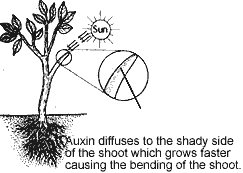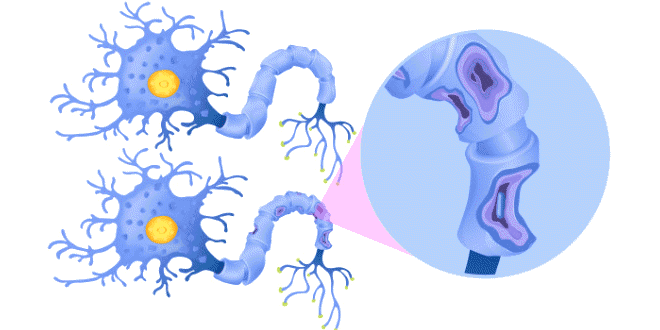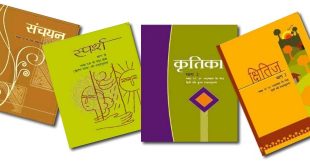Question: Name the hormone synthesized at the shoot tips. How does it help the plant to respond to light?
Answer: Auxin is synthesized at the shoot tips when growing plant detects light and helps the cells to grow longer.

When light is coming from one side of the plant, auxin diffuses towards the shady side of the shoot. This concentration of auxin stimulates the cells to grow longer on the side of the shoot which is away from light. Thus, the plant appears to bend towards light.
Question: (1). Different between sensory neurons and motor neurons.
(2). How is brain protected in our body?
(3). Name the part of the brain responsible for precision of voluntary actions and maintaining body posture and balance of the body.
Answer:
- Sensory neurons carry impulses from receptors to brain.
Motor neurons carry impulses from brain to effectors. - The brain is kept inside a bony box (skull). Inside the box, the brain is contained in a fluid-filled balloon which provides further shock absorption. This fluid is known as Cerebrospinal Fluid (CSF).
- These are possible due to a part of the hind-brain called the cerebellum.
Question: Name a hormone secreted by:
(1).Pancreas (2). Pituitary (3). Thyroid. Write one function of each of the hormones.
Answer:
- Insulin: controls blood sugar levels.
- Pituitary: growth hormone regulated growth and development.
- Thyroxine: regulates metabolism of carbohydrates, fats and proteins.
Question: (a). What is reflex arc?
(b). What are the components of reflex arc?
(c). How do muscle cells move?
Answer:
- The process of detecting the signal or the input and responding to it by an output action might be completed quickly. Such a connection is commonly called reflex arc.
- Stimulus → Receptors → Sensory neurons → Spinal cord → Motor neurons → Effector.
- Muscle cells have special proteins that change their shape and arrangement in the cell in response to electrical impulse. This leads the muscle cells shorten.
Question: (1). If the cerebellum is not functioning properly, what are the activities of our affected?
(2). How do muscle cells move?
Answer:
- If the cerebellum is not functioning properly, voluntary action of our body will be affected maintaining the posture and balance of the body.
- Muscle cells move by changing their shape so that they get shorten.
Question: (1). Name the hormone which is injected to a diabetic patient.
(2). Why should we used iodized salt in our diet?
(3). If iodine is insufficient in one’s diet, what might be the deficiency disease and its symptoms?
Answer:
- Insulin
- Iodine is necessary for the thyroid gland to secrete thyroxine hormone. Thyroxine regulates carbohydrates, proteins and fat metabolism in the body, to provide best balance for growth.
- If iodine is insufficient in one’s diet, iodine deficiency disease called goiter occurs. Symptom is swollen neck.
Question: (1). Name the part of brain which controls
(i) voluntary action,
(ii) involuntary action.
(2). What is the significance of the peripheral nervous system? Name the components of this nervous system and distinguish between the origin of the two.
Answer:
- (i) Voluntary actions – cerebellum;
(ii) Involuntary action – medulla oblongata. - The communication between the central nervous system and the other parts of the body is facilitated by the peripheral nervous system. Cranial nerves arise from the brain; Spinal nerves arise from the spinal cord.
Question: (1). Name the disease by which a person is likely to suffer due to the deficiency of: (i) iodine (ii) insulin
(2). How the timing of secretion and amount of hormone with example.
Answer:
- (i) Goiter
(ii) Diabetes - The timing and amount of hormone released are regulated by feedback mechanisms, e.g., if the sugar levels in blood rise, they are detected by the cells of the pancreas which respond by producing more insulin. As the blood sugar level falls, insulin secretion is reduced.
Question: (1). Name the hormone secreted by thyroid gland and state its function.
(2). Why is it important for us to have iodized salt in our diet?
(3). Name the disease caused due to deficiency of iodine and mention its main symptom.
Answer:
- The hormone secreted nu thyroid gland is thyroxine. It regulates carbohydrate, protein and fat metabolism in the body so as to provide the best balance for the growth.
- Iodine is necessary for the thyroid gland to make thyroxine hormone.
- The disease caused due to deficiency of iodine is Goiter. Its main symptom is swollen neck.
Question: Define reflex action. Give one example. Show with the help of a flow diagram the path of the reflex action.
Answer: Reflex action is a sudden action in response to something in the environment.
e.g., – pulling out hand from the flame if accidentally touched.
The path of the reflex action is as follows:
Receptors → Sensory neuron → Spinal cord
↓
(Effectors) ← Motor neuron
Question: Which signals will get disrupted in case of a spinal cord injury?
Answer: (a) Reflex action (b) Impulses from various body parts will not be conducted to brain. (c) Message from brain will not be conducted to various organs of the body.
Question: What is the difference between reflex action and walking?
Answer: Reflex action takes place without thought, i.e., it gives a reaction to stimuli. It is controlled by the spinal cord. It is an involuntary action. Walking takes place after thought, i.e., according to our wishes. It is controlled by a part of hind brain called cerebellum. It is a voluntary action.
Question: What happens at the synapse between two neurons?
Answer: Synapse is the gap between nerve ending of one neuron and dendrites of another. At synapse, the electrical impulse generated at dendrites of a neuron is passed on to dendrite of another neuron in the form of chemicals by on ending of the first neuron. Synapse ensures that nerve impulse travels only in one direction. A similar synapse allows the delivery of impulse from the neuron to the other cells, like muscle cells.
Question: Which part of the brain maintains posture and equilibrium of the body?
Answer: Cerebellum, which is a part of the hind brain.
Question: How do we detect the smell of an agarbatti (incense stick)?
Answer: Smell of an incense stick is detected by the olfactory receptors located in the fore-brain.
Question: What is the role of brain in reflex action?
Answer: Spinal cord is made up of nerves which supply information to think about. Thinking involves more complex mechanisms and neural connections. These are concentrated in the brain, which reacts to the stimuli and is the main coordinating center of the body. The brain and spinal cord constitute the central nervous system. They receive information from all parts of the body and integrate it. Hence, brain plays an important role in reflex action.
Question: What are plant hormones?
Answer: Plant hormones are chemicals present in plants which help to coordinate growth, development and responses to stimuli and environment. For example, auxins, gibberellins, cytolcinins, abscisic acids are different plant hormones.
Question: How is the movement of leaves of the sensitive plant different from the movement of a shoot towards light?
Answer: The movement of leaves of a sensitive plant is neither towards, nor away from the stimulus touch; it is a non-directional movement (nastic movement) while movement of shoot is towards the stimulus like light; it is a directional movement (tropic movement).
Question: Give an example of a plant hormone that promotes growth.
Answer: Auxin is the plant hormone that helps in cell growth and elongation. Gibberellins promote growth of stem.
Question: How do auxins promote the growth of a tendril around a support?
Answer: When tendrils come in contact with any support, the part of the tendril in contact with the object does not grow as rapidly as the part of the tendril away from the object. This is caused by the action of auxin hormone. Less auxin occurs on the side of contact as compared to the free side. As a result, auxin promotes growth on the free side and the tendrils coil around the support.
 Class Notes NCERT Solutions for CBSE Students
Class Notes NCERT Solutions for CBSE Students





